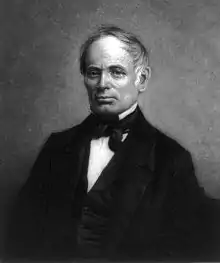Adin Ballou
Adin Ballou (1803–1890) was an American proponent of Christian nonresistance, Christian anarchism, and Christian socialism. He was also an abolitionist and the founder of the Hopedale Community. Through his long career as a Universalist and Unitarian minister, he tirelessly advocated for the immediate abolition of slavery and the principles of Christian anarcho-socialism, and promoted the nonviolent theory of praxis (or moral suasion) in his prolific writings. Such writings drew the admiration of Leo Tolstoy,[1] who frequently cited Ballou as a major influence on his theological and political ideology in his nonfiction texts like The Kingdom of God is Within You, along with sponsoring Russian translations of some of Ballou's works. As well as heavily inspiring Tolstoy, Ballou's Christian anarchist and nonresistance ideals in texts like Practical Christianity were passed down from Tolstoy to Mahatma Gandhi, contributing not only to the nonviolent resistance movement in the Russian Revolution led by the Tolstoyans but also Gandhi's early thinkings on the nonviolent theory of praxis and the development of his first ashram, the Tolstoy Farm. In a recent publication, the American philosopher and anarchist Crispin Sartwell wrote that the works by Ballou and his other Christian anarchist contemporaries like William Lloyd Garrison directly influenced Gandhi and Martin Luther King Jr.[2]

Ballou was a prominent local historian for Milford and wrote one of the earliest complete histories of the town in 1882, "History of the town of Milford, Worcester county, Massachusetts, from its first settlement to 1881".[3]
Ballou became a lifelong advocate of Christian pacifism by 1838. Standard of Practical Christianity was composed in 1839 by Ballou and a few ministerial colleagues and laymen. The signatories announced their withdrawal from "the governments of the world." They believed the dependence on force to maintain order was unjust and vowed to not participate in such government. While they did not acknowledge the earthly rule of man, they also did not rebel or "resist any of their ordinances by physical force." "We cannot employ carnal weapons nor any physical violence whatsoever," they proclaimed, "not even for the preservation of our lives. We cannot render evil for evil... nor do otherwise than 'love our enemies.'"[4]
In 1843, he began to serve as president of the New England Non-Resistance Society.[4]
See also
References
- Tolstoy, Leo (1894). . Cassell Publishing Company. pp. 8–21.
- Sartwell, Crispin (January 1, 2018). "Anarchism and Nineteenth-Century American Political Thought". Brill's Companion to Anarchism and Philosophy: 454–483. doi:10.1163/9789004356894_018. ISBN 9789004356887.
- Ballou, Adin (1882). History of the town of Milford, Worcester county, Massachusetts, from its first settlement to 1881. Boston: Rand, Avery, & co. (2 vols)
- Weinberg, Arthur; Weinberg, Lila Shaffer (1963). Instead of violence. New York: Grossman Publishers. p. 375.
Further reading
- Ballou, Adin (1854). Practical Christian Socialism: A Conversational Exposition of the True. Fowlers and Wells. ISBN 9780524016404.
- Ballou, Adin (2008). The Voice of Duty: An Address at the Anti-Slavery Picnic at Westminster, Massachusetts July 4, 1843. Hopedale, Milford, Mass.: Community Press. Archived from the original on March 25, 2014.
- Gougeon, Len (February 2000). "Ballou, Adin". American National Biography Online. Retrieved February 19, 2008.
- Hughes, Peter (December 12, 2000). "Adin Ballou". In Andrews, Barry; et al. (eds.). Dictionary of Unitarian and Universalist Biography. Unitarian Universalist History & Heritage Society.
External links
- Works by or about Adin Ballou at Internet Archive
- Works by Adin Ballou at LibriVox (public domain audiobooks)

- Friends of Adin Ballou
- Christian Non-Resistance in All Its Important Bearings (his principal work on pacifism)
- Anarchy Archives Section on Ballou.